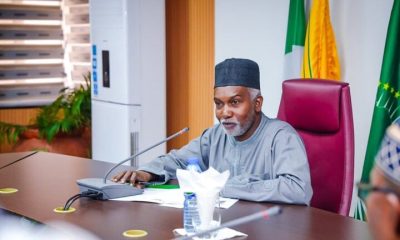The International Monetary Fund has cut its forecast for Nigeria’s economic growth in 2024 to 3.1 per cent.
The downgrade is contained in a newly released report ‘in the July 2024 World Economic Outlook’ published Tuesday.
The IMF cited a weaker growth recorded in the first quarter of the year, Q1’24 as reason for the new forecast.
The downgrade represents 0.2 percentage points below the earlier forecast of 3.3 per cent.
The downgrade followed weaker-than-expected Gross Domestic Product, GDP, and growth recorded by the country in Q1’23.
The IMF however retained its 3.0 per cent forecast for Nigeria’s economic growth in 2025.
It would be recalled that Data from the National Bureau of Statistics (NBS), showed that Nigeria’s Gross Domestic Product (GDP), growth dropped, quarter-on-quarter, QoQ to 2.98 per cent in Q1’24 from 3.46 per cent in the fourth quarter of 2023, Q3’23.
As a result of the lower forecast for Nigeria’s economic growth, the IMF also downgraded its forecast for Sub-Saharan economic growth in 2024 to 3.7 per cent from the April WEO forecast of 3.8 per cent. It however raised its economic growth forecast for the region in 2025 to 4.1 per cent from 4.0.
“The forecast for growth in sub-Saharan Africa is revised downward, mainly as a result of a 0.2 percentage point downward revision to the growth outlook in Nigeria amid weaker than expected activity in the first quarter of this year,” the IMF said.
For the global economy, the IMF retained its growth forecasts of 3.2 per cent in 2024 and 3.3 per cent in 2025.
The IMF said: “The Global Economy in a Sticky Spot Global growth is projected to be in line with the April 2024 World Economic Outlook (WEO) forecast, at 3.2 per cent in 2024 and 3.3 per cent in 2025.
“However, varied momentum in activity at the turn of the year has somewhat narrowed the output divergence across economies as cyclical factors wane and activity becomes better aligned with its potential.
“Services price inflation is holding up progress on disinflation, which is complicating monetary policy normalization. Upside risks to inflation have thus increased, raising the prospect of higher-for-even-longer interest rates, in the context of escalating trade tensions and increased policy uncertainty.
“To manage these risks and preserve growth, the policy mix should be sequenced carefully to achieve price stability and replenish diminished buffers.”
The development comes on the heels of Nigeria’s inflation figure reaching a new high, hitting 34.19 % for June 2024, according to the latest data from the NBS.
This is an increase of 0.24% compared to the inflation figure for May 2024 released by the NBS.
“In June 2024, the headline inflation rate increased to 34.19% relative to the May 2024 headline inflation rate which was 33.95%. Looking at the movement, the June 2024 headline inflation rate showed an increase of 0.24% points when compared to the May 2024 headline inflation rate,” the NBS said in its Consumer Price Index (CPI) – which measures the average change over time in the prices of goods and services consumed by people for day-to-day living – released on Monday.
“On a year-on-year basis, the headline inflation rate was 11.40% points higher compared to the rate recorded in June 2023, which was 22.79%.”
According to the NBS, the headline inflation rate, year-on-year basis, jumped in June 2024 when compared to the same month in the last year.
It said on a month-on-month basis, the headline inflation rate in June 2024 was 2.31%, 0.17% higher than the rate recorded in May 2024 (2.14%).
“This means that in the month of June 2024, the rate of increase in the average price level is higher than the rate of increase in the average price level in May 2024,” the agency said.
As expected, there was a rise in food inflation for June 2024 in comparison with the figure recorded in May 2024.
“On a month-on-month basis, the Food inflation rate in June 2024 was 2.55% which shows a 0.26% increase compared to the rate recorded in May 2024 (2.28%),” the CPI report read.
According to the NBS, this hike was triggered by a rise in the average prices of food items such as groundnut oil, palm oil, etc (oil & fats class), water yam, cocoyam, cassava, etc (potatoes, yam & other tubers class), tobacco, catfish fresh, croaker, mudfish fresh, snail, etc, (fish class).
The Federal Government had in the wake of the galloping prices of essential commodities, reeled out a raft of measures to address the challenge. It recently suspended duties, tariffs, and taxes on the importation of maize, husked brown rice, wheat, and cowpeas through the country’s land and sea borders, for 150 days.
It also approved the procurement of 2,000 tractors, and 1,200 trailers and set up a committee to help in proffering solutions to the food crisis rocking the nation.
Experts have blamed insecurity, lack of equipment, and other issues as major challenges affecting food production in Nigeria.

 Privacy5 years ago
Privacy5 years ago
 News5 years ago
News5 years ago
 Entertainment4 years ago
Entertainment4 years ago
 News5 years ago
News5 years ago
 Opinion5 years ago
Opinion5 years ago
 News5 years ago
News5 years ago
 Sports4 years ago
Sports4 years ago
 Entertainment4 years ago
Entertainment4 years ago















